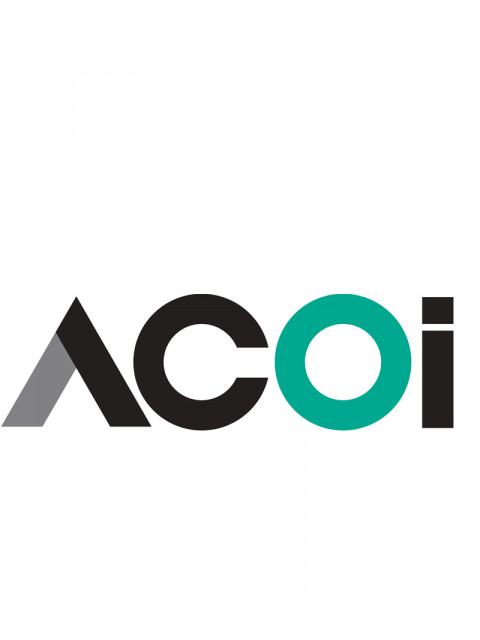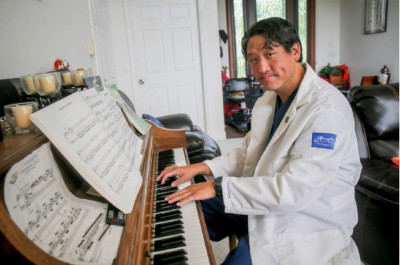
Voices Across ACOI: Jasper Yung, DO, FACOI
by ACOI
May 19, 2025
Introducing Voices Across ACOI. Each month, you’ll find the same in-depth stories about ACOI members in the same space – just under a new name. It is important to us to highlight the variety of stories and experiences that make up our community of members. By amplifying individual voices, we can speak even more clearly to ACOI being a place of connection and belonging. If you'd like to be highlighted in an upcoming issue, contact us!
The Healing Power of Creativity and Community
 In recent years, it’s become clear how important it is to connect with others and create community. Making those connections requires making an effort, but doing so can lead to greater well-being and fulfillment. Jasper Yung, DO, FACOI, is an internal and emergency medicine specialist who understands this in-depth, thanks to the time he spends not just in service to patients, but to his community as a whole. In a recent Physician Wellness Committee article for the March ACOI newsletter, “Giving Back is How We Grow,” he shared his thoughts on these themes, and the formative experiences with local organizations Operation Good Cheer and the Detroit Medical Orchestra that prompted those thoughts.
In recent years, it’s become clear how important it is to connect with others and create community. Making those connections requires making an effort, but doing so can lead to greater well-being and fulfillment. Jasper Yung, DO, FACOI, is an internal and emergency medicine specialist who understands this in-depth, thanks to the time he spends not just in service to patients, but to his community as a whole. In a recent Physician Wellness Committee article for the March ACOI newsletter, “Giving Back is How We Grow,” he shared his thoughts on these themes, and the formative experiences with local organizations Operation Good Cheer and the Detroit Medical Orchestra that prompted those thoughts.
In a recent conversation, Dr. Yung expanded upon his experiences, starting with the Detroit Medical Orchestra. This unique nonprofit’s mission is “to explore the connections between music and healing, foster partnerships among medical and health professionals, and provide community services and community arts services to improve the quality of life for all in the Detroit community.” Since 2014, Dr. Yung has played with them as a violinist.
“It’s such a wonderful group,” he said. “They collect donations, but the concerts are completely free. Of the donations they take, fifty percent go towards either a medical program or a music program around the community.” It has also opened fascinating doors for Dr. Yung, including getting to play with renowned violinist Joshua Bell and fellow orchestra members for a special livestream showcase during the pandemic.
What Dr. Yung valued most about this experience was its relationship-oriented nature. “During the pandemic when everyone was isolated, going through stress and uncertainty, [the music group] was such a wonderful experience [to counteract that]. It was such a blessing – they gave us the opportunity to connect through music and show that we’re not alone.”
It’s clear that Dr. Yung believes deeply in the power of finding common ground with others, whether that’s through service or conversation. That perspective influences both his work as a physician and the way he approaches life.
Charting a Course through Unexpected Change
Though Dr. Yung had a roundabout path to becoming an osteopathic physician, he was interested in medicine early on, and during high school, volunteered in the emergency room at a local hospital. Then college at the University of Michigan led him to a degree in communications, and a career in advertising and marketing, which sent him as far away as Pakistan, and eventually to work with a video game company in California.
It was a family emergency that changed his path and brought him full circle. When his father had a stroke that affected the entire left side of his body, Dr. Yung returned to Michigan to help him recover. Learning about what his father was going through prompted a return to his interest in medicine. This led him to take the MCATs; he was ultimately accepted to Lake Erie College of Osteopathic Medicine – Bradenton in Florida.
Dr. Yung found osteopathic medicine both practically and philosophically compelling – “a more complete picture” medically. Helping his father recover from the stroke gave his medical education a deeper dimension, and a sense of what it meant to treat the whole person. “My father and his stroke’s mechanical limitations meant I had an extra way to understand pathology and the philosophy of medicine,” he shared. Meaning, “His stroke affected multiple aspects [of his body and his life]. Day-to-day living, interactions and [sense of] community, the way he got around the house...our dynamics all completely changed.”
Dr. Yung took on a dual residency in emergency and internal medicine with the St. John Providence Health Systems at the former St. John McHolm Osteopathic Division. (The division has been absorbed into Henry Ford/Ascension Macomb-Oakland Hospital where he now serves as an emergency physician.) Regular involvement with the Michigan Osteopathic Association (MOA) helped him to become a fellow shortly after graduating.
“When I graduated from residency, the MOA welcomed me in like a family. It was amazing. They helped guide me along the way with advocacy and state representation for our medical students, interns, and physicians in practice.” Staying active with the MOA was also what connected Dr. Yung to ACOI and the Physician Wellness Committee. A member since he was a resident, Dr. Yung said ACOI has been incredibly supportive, giving him the chance to give back and continue learning every step of the way.
Finding a Fully Integrated Perspective
Dr. Yung is currently part of the Michigan State University College of Osteopathic Medicine’s clinical faculty, in addition to his work in emergency medicine at Ascension. He is also involved with the American Osteopathic Association (AOA), part of the MOA’s Board of Trustees, and president-elect and member of the Foundation of Osteopathic Emergency Medicine (FOEM).
To Dr. Yung, these diverse activities all mesh in a holistic way. He integrates them into his life – without losing enthusiasm or falling into burnout – by applying that same holistic perspective to himself. That’s also what he’s been able to do with the Detroit Medical Orchestra: playing violin with them offers not just a sense of community, but also a way to decompress, and to engage in something that brings him joy.
He had an early introduction to music: he started playing piano at age four, and learned from a variety of influences, including local community teachers and more recognizable names like Vladimir Horowitz. From there, he pursued the trumpet in middle school, and the violin in high school, playing with the Metropolitan Youth Orchestra and Civic City Orchestra. Between high school and medical school, music took a backseat; it wasn’t until after residency that Dr. Yung picked up a violin again. Inspired by his brother, a podiatrist and fellow musician who connected him with the Detroit Medical Orchestra, Dr. Yung rediscovered an important creative outlet. “Music always helps whenever I have a hard day, especially in the ER,” he said. "It’s such a great way to channel emotions.”
His involvement with the Physician Wellness Committee reflects this passion for creative expression as a healing and cathartic force. The group often discusses the importance of engaging in music, art, and practices like guided breathing to release the stress they take on as physicians. “It’s about taking care of the caretakers,” he said. “Since COVID, there’s just so much burnout that’s happening. People forget that we’re people too. There has to be some kind of internal maintenance – whether it’s taking a pause for our sanity or stepping outside ourselves to be part of a community.”
Caring for the Whole Person, in Medicine and in Life
Dr. Yung expressed appreciation for how ACOI and the Physician Wellness Committee are guided by this willingness to see physicians holistically – truly, in the same way osteopathic physicians see their patients. Encouraging physicians to have this perspective toward themselves – and engage in this kind of self-care – can protect them from destructive outcomes like burnout and moral distress. Dr. Yung has seen firsthand how it helps to connect with patients on a personal level.
“As a physician,” he said, “it’s a lot easier to build rapport with patients when they know you’re not just one-dimensional – that we’re not just medicine providers or customer service. When I talk to patients who are into music or have backgrounds in music [about what I do], it opens their eyes. It's refreshing, and it helps them see there’s more to medicine and more to us.”
Showing up in this way means Dr. Yung can access the healing power of community and connection on multiple levels. “One of my mentors told me, ‘People don’t care what you know until they know that you care’ – until they see you’re not just there to deal with symptoms and treatment. It's not just delivering care one-dimensionally. It's about connecting with them,” he said. “And having a role as part of the community – not just as a physician, but as a whole person.”

